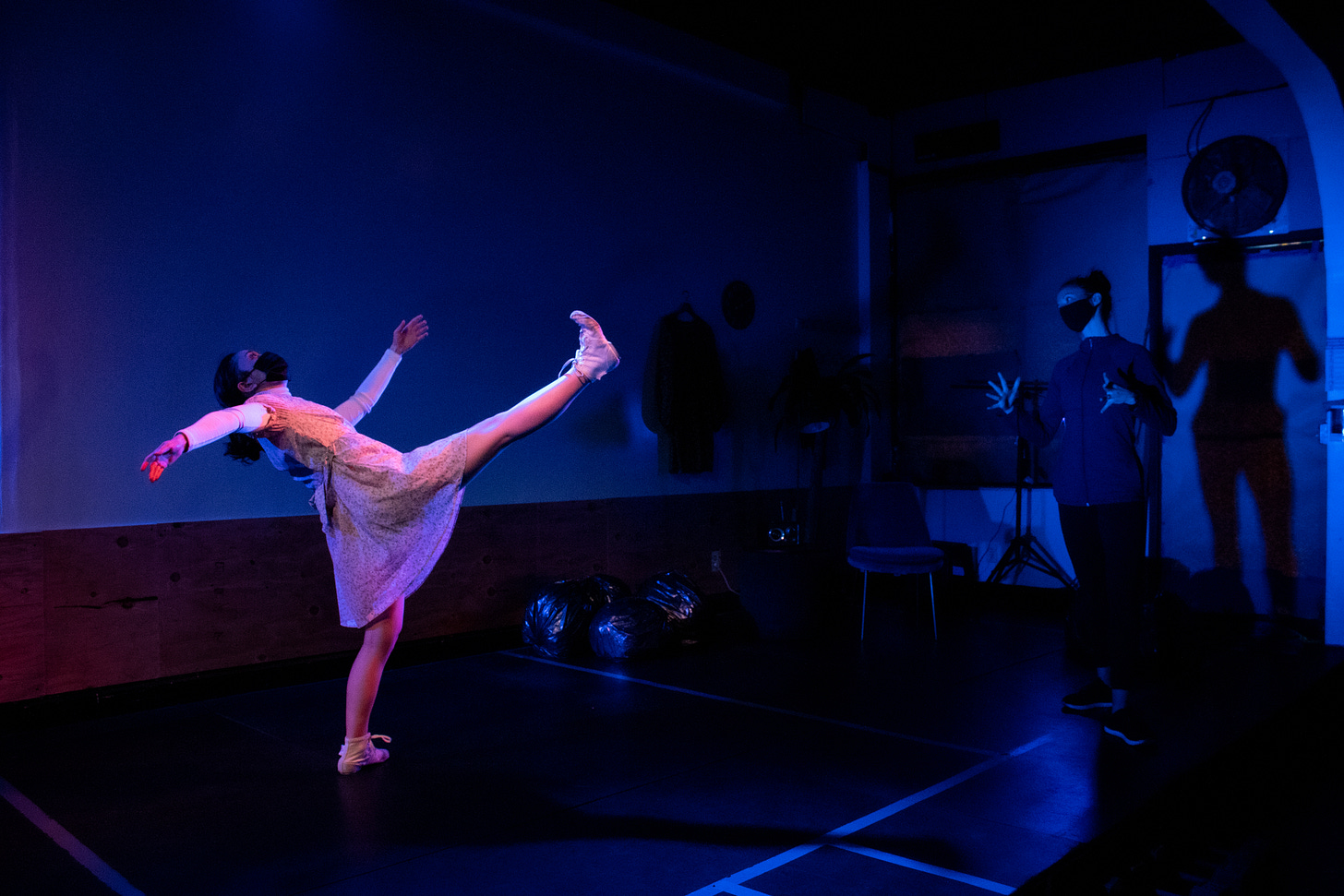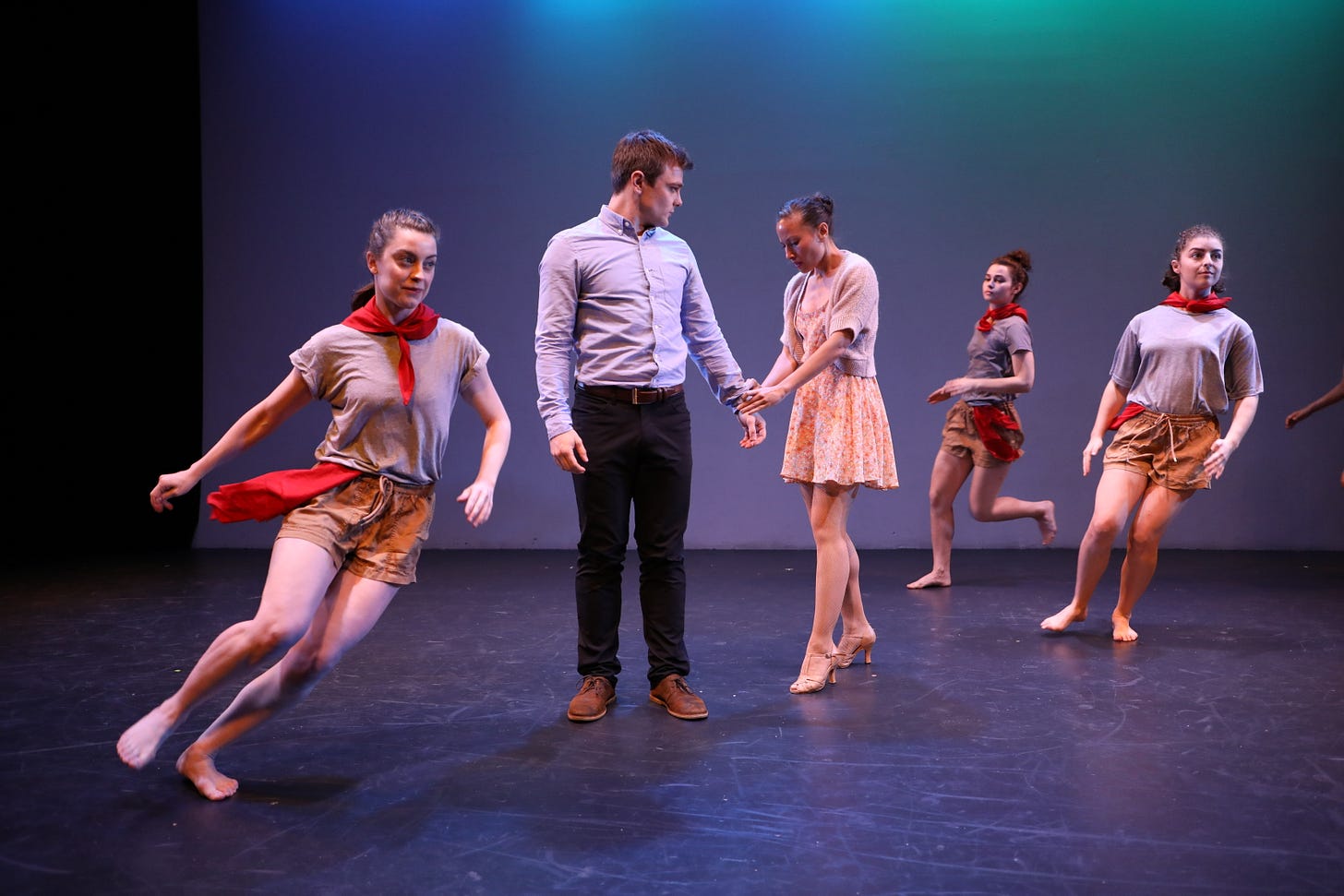Fragments and Cacophonies
Talking fascism and queerness with artists behind two shows that start Friday
This Friday marks the first performance of Fragments, a live audio story staged in a repurposed Upper West Side fitness studio. It also marks the first night of Harsh Cacophonies I & II, a live-stream production broadcast from The Tank’s empty mainstage theater. I spoke to the artists behind both shows.
Fragments debuted last summer at Dixon Place as a dance-theater fusion piece, directed and produced by Mandie Rapoza. The show explores the complex life of Rapoza’s grandmother Herta, who through the fog of Alzheimer’s wrestles with her childhood involvement in the Hitler Youth.
Rapoza and playwright Brian Kettler have reimagined the piece for 2020 as a “live audio story.” Distanced audiences of eight will experience an audio drama complemented by projections, immersive lighting, and one live dancer. I spoke to Rapoza and Kettler about the inspiration behind Fragments and reimagining the piece for this moment.
How did your relationship with your grandmother form the initial inspiration for Fragments?
Mandie Rapoza (director/producer): There were questions I wanted to ask my grandmother about her childhood involvement with the Nazi party. I expected that she would say, “It was awful, it was terrible, it was something I wish I had never been a part of.” Instead she said, “It was the first time I wasn’t hungry as a child, it gave me purpose, and it gave me something to belong to.”
How could it be that the woman who showered me with love as I was growing up is also someone who, if I didn’t know them, I would label as evil? If even with the benefit of hindsight she still looked back fondly, how much was she indoctrinated?
As the Alzheimer’s took over, sometimes my grandmother might not know who I was - but her emotions were actually heightened. That brought me around to the idea of using dance and music heavily in the piece to communicate those feelings.
Brian Kettler (playwright): I’m Jewish and my grandfather was a Holocaust survivor, so I immediately connected in that way. [This] idea of a young woman who was looking for balance and stability and a family unit, and finds that in the Hitler Youth in Austria, was to me just an extraordinarily compelling hook.
How are you telling Herta’s story?
Mandie: It tracks from present day Herta’s mind. You see her as a child, in the middle of her life when she’s raising a child, and at the end of her life. But because her memory [is failing her], it’s a very fractured structure.
Brian: This is not an A-to-B narrative. It’s this woman with Alzheimer's sort of negotiating through her memories.
Mandie, given your personal connection to the material, how much of your own perspective is present?
Mandie: It is tempting to make it about some sort of remorse. But the thing is, we know how to talk about someone we label as evil, and we have rich stories about Holocaust survivors. What is really hard to wrap our head around is all the people in the middle. Which is what most of us are, or would be. I tried to guide it more towards asking questions, and leaning into the complexity of it.
After the Dixon Place premiere you planned to keep expanding Fragments as a dance-theater piece. Then the world changed. Why bring it back now, in this new form?
Mandie: I never wanted it to be a sacrifice. I want people to come in and have a full live experience. An audio-drama with visual elements made sense in capturing the vividness of her memories. That’s why we have the youngest version of my grandmother as the live performer, while the present day is film footage. To cross those time frames with different forms felt like a storytelling format that would enhance the piece.
That idea of the “middle people,” the people who stand by when evil is done in their name, is present in many people’s minds right now. How do you put us in Herta’s head and make her sympathetic?
Brian: Being able to hear the indoctrination as a soundscape - the chants, and the songs, the marching - that is how we create nuance and empathy. What if you wanted a family more than anything else, and you were really young, and you found an opportunity for that in a Hitler Youth camp? How would that affect the whole rest of your life - how you act in your marriage, as a mother, in your career?
Mandie: It’s a very individual story. The time is always important to look inside and confront the darkest side of yourself. It really is about her refusal to do that until she’s forced to.
Brian: Hearing the sound of, “Now you belong, and we’re all together, we’re all united,” it is hard not to think about what I imagine is the pure pleasure of Trump rallies. To feel united against an enemy. We’re all on the same team, and we get to chant and sing and laugh at our enemies. I’ll never fully understand it but, at least that instinct...it’s the intoxication of belonging. An audience will get that even clearer in this version.
Fragments performs November 13th & November 20th at 8.30pm only; or November 14th, 15th, 21st and 22nd at 4:30pm, 6pm and 7:30pm.
Email fragmentstickets@gmail.com with your 1st, 2nd and 3rd choice date/time, and number of tickets requested.
Kev Berry wrote and performed A Faggot’s Theology in 2018 and A Sissy’s Physiology in 2019 as part of a planned five-play cycle. Harsh Cocophanies I & II combines the two into a single evening. The show will stream live from The Tank’s mainstage Nov 13th & 14th, seemingly the first show to do so from a Manhattan theater since the shutdown. I spoke with Berry and director Alex Tobey about bringing it to virtual life.
What is Harsh Cacophonies I & II?
Kev Berry (playwright/performer): Harsh Cacophonies I & II is two 45-minute-ish long monologues dealing with things we don’t like to talk about very much in the gay community. Body image, for the first half, feeling desperate to be perfect when you look at yourself in the mirror. Then in the second half, we talk about the intersection of queerness, and what it means to want to have religion and spirituality as a gay man.
Early in the pandemic you streamed monologues from your own apartment - I think you were one of the first. For this show, why did it feel important to be on The Tank’s mainstage?
Kev: I saw the stuff that they were doing in London and a couple other theaters around the country and I thought, “Why is no-one in New York doing this?” So I figured out how I could do it.
In terms of considering the spiritual and sacred, Alex, how does that inform how you’ve directed the show?
Alex Tobey (director): In March, I thought I would never be back in a theater again. I thought, “This is it, the theater as we know it is over, maybe I’ll go to law school.” So to be back in a theater and find a way for audiences to share that space with us, even if they’re not physically there - that return to normalcy does feel sacred.
We open with this aside to the audience, directly to the camera, with Kev saying: “So here’s some things you need to know.” Which allows people to come in and share that space a little bit more. One of the big goals is to lean into the magic of that. Leaning into the idea that we’re in this magical thing that shouldn’t exist right now. We’re in a theater, something that months ago wouldn’t even have been possible.
For many of us, our relationships with our bodies are more intense during this time. Not only because we’re thinking about our health, but also figuring out how much to even care about your appearance when you’re seeing far fewer people.
Kev: All the stuff [about the physical self[ I wrote before the pandemic, but the telling of it is informed by the shit we’re stuck in. It’s a lot about coming to terms with, “This is who I am.” Which has been resonating a lot with me lately, because my anxiety right now is who I am, and I have to learn how to deal with it. It’s about coming to terms with you being you.
Alex: A lot of it is about removing external judgment and external standards as well. In this world in which we’re seeing fewer people, doing things for ourselves feels like the much more pressing, urgent and necessary thing.
Kev, you’re the whole show. How do you bring yourself to it day-to-day?
Kev: I’ve been in an anxiety episode for the last couple days. So that’s in the show now, because it’s where I’m at, and I bring myself to the show.
Alex: Never at any point is Kev pretending to be anyone other than himself on stage talking to us. So during days in which he feels a little anxious, Kev on stage feels a little anxious. During days where Kev on stage feels happy, the show feels happy. We’re never trying to fight the emotional state that he’s in, or the emotional state that we’re all in.
Alex, you were initially resistant to virtual theater. Now you’re taking on this challenge of the first live-streamed show from a theater in Manhattan. How has that learning curve been?
Alex: Kev’s style is very purposefully bare and stripped down. There’s a microphone, there’s a chair, there’s a table with a record player on it, and that’s it. We have some bare lightbulbs hanging down, but there’s no set, quick changes or sound effects. At surface level that feels like it should be very straightforward.
The layer of technical complexity that goes into [making it] feel clean and bare-bones is an exciting thing to reckon with. It’s only a four camera set-up, but still. Just the cabling, and the conversions. We have whole conversations about HDMI cable vs. SDI cable.
It’s very humbling. We’re dealing with, for example: How are we picking up sound from different places? The answer is, there’s ten different boards that go into another board, that go into another mixer, that go into another streaming thing, that are then mixed in another place.
From everything you guys are saying, yes these live-streams from a theater are tricky and complex - but it can be done.
Alex: If The Tank can do it, anyone can.
Kev: If we can do it with no money and a bunch of lightbulbs, people with resources could make a fucking rock concert.
Alex: No shade to The Tank. But yes, if we can do it with no money and minimal resources. But shout out to The Tank for doing it!







